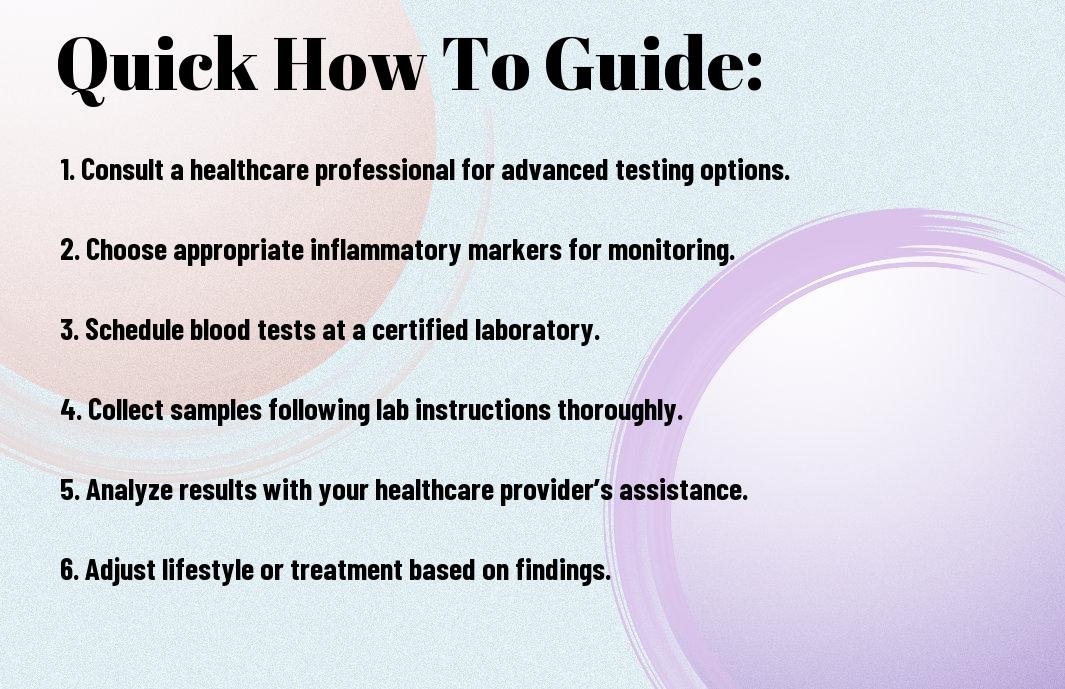As chronic inflammation can lead to serious health issues, you need to monitor your inflammatory markers regularly. You will learn how to use advanced testing to track your levels and make informed decisions about your health. By following these steps, you can identify early warning signs of inflammation and take proactive measures to reduce your risk of developing related diseases, ultimately taking control of your overall well-being.

Key Takeaways:
To effectively monitor inflammatory markers, consider the following points:
- Utilize blood tests to measure C-reactive protein (CRP) and erythrocyte sedimentation rate (ESR), which are commonly used indicators of inflammation in the body.
- Implement advanced imaging techniques, such as magnetic resonance imaging (MRI) or positron emission tomography (PET), to visualize and assess inflammatory processes in specific tissues and organs.
- Leverage genetic testing to identify genetic markers associated with inflammatory diseases, enabling early intervention and personalized treatment strategies.
- Monitor oxidative stress levels using biomarkers like 8-hydroxy-2′-deoxyguanosine (8-OHdG), which can indicate the presence of inflammation and cellular damage.
- Combine inflammatory marker testing with clinical evaluations and medical history to gain a comprehensive understanding of a patient’s inflammatory status and develop effective treatment plans.

Understanding Inflammatory Markers
While inflammatory markers are a natural response to injury or infection, chronic inflammation can lead to serious health issues. You need to understand what inflammatory markers are and how they affect your body. Inflammatory markers, such as C-reactive protein (CRP) and erythrocyte sedimentation rate (ESR), indicate the level of inflammation in your body.
Identifying Key Inflammatory Markers
For instance, you should be aware of the different types of inflammatory markers, including interleukins and tumor necrosis factor-alpha (TNF-alpha). These markers can help you identify the underlying causes of inflammation and track the effectiveness of treatment.
The Importance of Monitoring Inflammatory Markers
With regular monitoring, you can detect early signs of inflammation and take proactive steps to prevent chronic diseases, such as arthritis, diabetes, and heart disease. You can work with your healthcare provider to develop a personalized plan to manage inflammation and improve your overall health.
Inflammatory markers can have a significant impact on your quality of life, and uncontrolled inflammation can lead to severe consequences, including organ damage and increased risk of mortality. You should take an active role in monitoring your inflammatory markers and making lifestyle changes to reduce inflammation and promote overall well-being. By doing so, you can improve your health outcomes and increase your lifespan.
Pre-Test Preparation
Now that you’re considering advanced testing to monitor inflammatory markers, it’s necessary to understand the process. You can learn more about Advanced Inflammatory Marker Testing to get started.
How to Prepare for Advanced Testing
On the day of the test, you’ll need to:
- Follow specific dietary restrictions
| Test Type | Preparation |
|---|---|
| Blood Test | Fasting for 8 hours |
Tips for Accurate Test Results
Prior to testing, inflammatory marker levels can be affected by various factors. You should:
- Avoid strenuous exercise
- Get enough sleep
Assume that your test results will be more accurate if you follow these guidelines.
This information will help you prepare for your test. You should also:
- Inform your doctor about any medications you’re taking
- Avoid alcohol consumption before the test
Assume that accurate test results depend on your preparation and honesty with your doctor. This will help you get the most out of your inflammatory marker testing.

Choosing the Right Testing Method
To determine the best approach for monitoring inflammatory markers, you need to consider your individual needs and health status.
Factors to Consider When Selecting a Testing Method
Rightly selecting a testing method involves evaluating several factors, including
- cost
- accuracy
- reliability
. The most important thing is to choose a method that suits your needs.
Common Testing Methods for Inflammatory Markers
Methodically, you will find that common testing methods include blood tests and imaging tests.
Markers of inflammation, such as C-reactive protein and erythrocyte sedimentation rate, can be detected through these methods, helping you identify potential health risks and take proactive steps to mitigate them, as you work to maintain your overall well-being.

Interpreting Test Results
Despite the complexity of advanced testing, interpreting your results can be straightforward with the right guidance. You will receive a comprehensive report outlining your inflammatory marker levels, which will help you understand your overall health and identify potential areas of concern.
How to Analyze Test Results
There’s a simple approach to analyzing your test results: look for any markers that are outside of the normal range, as these may indicate inflammation or other health issues. You should also consider your overall health and medical history when evaluating your results.
Understanding Test Result Variations
Testing your inflammatory markers can be a highly effective way to monitor your health, and understanding variations in your test results is key to identifying potential health risks. You may notice fluctuations in your results over time, which can be caused by a variety of factors, including changes in your diet or lifestyle.
Results can vary from one test to another, and it’s vital to consider these variations when evaluating your overall health. If you notice any significant or persistent elevations in inflammatory markers, such as high levels of C-reactive protein (CRP), you should consult with your healthcare provider to discuss the potential implications and develop a plan to reduce inflammation and improve your health. By closely monitoring your test results and making informed decisions, you can take control of your health and reduce your risk of developing chronic diseases.
Using Test Results to Inform Treatment
Many patients undergo Advanced inflammatory marker testing to assess their risk of chronic diseases. This information helps you make informed decisions about your treatment plan, focusing on reducing inflammation and preventing further complications.
How to Create a Treatment Plan Based on Test Results
Results from your tests will guide your healthcare provider in developing a personalized treatment plan, taking into account your specific inflammatory markers and overall health. You will work together to set goals and choose the most effective interventions to manage your condition.
Tips for Adjusting Treatment Plans
Assuming you have a treatment plan in place, you can adjust it as needed based on your test results. Consider the following:
- Inflammatory marker levels
- Disease progression
- Treatment side effects
- Lifestyle changes
- Medication adjustments
- Alternative therapies
- Inflammatory marker levels
- Treatment side effects
- Lifestyle changes
- Medication interactions
- Dietary changes
- Physical activity levels
Thou should prioritize your health and consult your healthcare provider regularly to ensure your treatment plan is working effectively, addressing inflammation and promoting overall well-being.
Tips for adjusting treatment plans involve continuously monitoring your inflammatory markers and making adjustments as needed. Consider the following:
Thou should always consult your healthcare provider before making any significant changes to your treatment plan, ensuring you are managing inflammation and minimizing risks associated with your condition.
Monitoring Progress and Adjusting Strategies
All patients require continuous monitoring of their inflammatory markers to adjust treatment strategies effectively. You can learn more about Inflammatory Markers | Choose the Right Test to make informed decisions.
How to Continuously Monitor Inflammatory Markers
Now that you have started monitoring your inflammatory markers, you need to continuously track them to understand the effectiveness of your treatment strategy and make adjustments as needed.
Factors to Consider When Adjusting Treatment Strategies
Little adjustments to your treatment strategy can have a significant impact on your condition. When adjusting your strategy, consider the following factors:
. Recognizing these factors will help you make informed decisions about your treatment strategy.
A thorough understanding of the factors that influence your condition is imperative for effective treatment. You should consider the following factors when adjusting your treatment strategy:
. Recognizing the impact of these factors on your condition will help you work with your healthcare provider to develop a personalized treatment plan that addresses your unique needs and helps you achieve optimal health outcomes.
To wrap up
Now that you have explored the process of using advanced testing to monitor inflammatory markers, you can apply this knowledge to your health regimen. You will be able to identify and track your inflammatory markers, allowing you to make informed decisions about your diet and lifestyle. By doing so, you can take control of your health and reduce your risk of chronic diseases, enabling you to lead a healthier life with your newfound understanding of advanced testing methods.
FAQ
Q: What are inflammatory markers and why are they important to monitor?
A: Inflammatory markers are biological indicators that measure the level of inflammation in the body. They are important to monitor because chronic inflammation is associated with various diseases, such as arthritis, diabetes, and cardiovascular disease. Advanced testing can help identify individuals at risk and monitor the effectiveness of treatments. By tracking inflammatory markers, individuals can take proactive steps to reduce their risk of developing these conditions and improve overall health.
Q: What types of advanced tests are available to monitor inflammatory markers?
A: Several advanced tests are available to monitor inflammatory markers, including blood tests, such as C-reactive protein (CRP) and erythrocyte sedimentation rate (ESR), and imaging tests, such as MRI and PET scans. These tests can help identify specific inflammatory markers, such as cytokines and chemokines, and monitor their levels over time. Additionally, some tests can also identify genetic markers associated with inflammation, providing valuable insights into an individual’s risk profile.
Q: How often should I get tested for inflammatory markers, and what are the benefits of regular testing?
A: The frequency of testing for inflammatory markers depends on individual factors, such as medical history, family history, and lifestyle. Generally, individuals with a high risk of chronic inflammation may need to get tested more frequently, such as every 6-12 months. Regular testing can help identify potential health issues early, allowing for prompt intervention and prevention of disease progression. It can also help monitor the effectiveness of treatments and make adjustments as needed, ultimately improving health outcomes and quality of life.
Q: What can I do to reduce my inflammatory markers and prevent chronic inflammation?
A: Several lifestyle modifications can help reduce inflammatory markers and prevent chronic inflammation, including a balanced diet rich in fruits, vegetables, and whole grains, regular exercise, such as cardio and strength training, stress management techniques, such as meditation and yoga, and getting adequate sleep. Additionally, avoiding smoking and limiting exposure to environmental toxins can also help reduce inflammation. In some cases, supplements, such as omega-3 fatty acids and turmeric, may also be beneficial in reducing inflammation, but it’s necessary to consult with a healthcare professional before adding any new supplements to your regimen.
Q: How can I interpret my test results and work with my healthcare provider to develop a personalized plan?
A: Interpreting test results for inflammatory markers requires consultation with a healthcare provider, as they can vary depending on individual factors, such as age, sex, and medical history. A healthcare provider can help you understand your test results, identify any abnormal values, and develop a personalized plan to reduce inflammation and prevent chronic disease. This plan may include lifestyle modifications, supplements, and/or medication, and regular follow-up testing to monitor progress and make adjustments as needed. By working closely with your healthcare provider, you can take a proactive approach to managing inflammation and improving your overall health and wellbeing.



